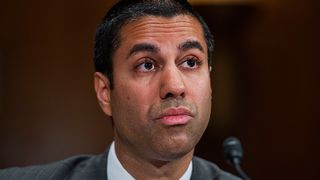Pai: FCC Will Encourage Innovations Like Free Data Plans

FCC chairman Ajit Pai told an American Enterprise Institute audience Friday that he had hit the ground running since taking over in January, including removing regs, improving process, taking steps to close the digital divide, and encouraging innovations like wireless free data offerings.
Pai was providing a snapshot of his first 100 days, suggesting it captured a pro-innovation, pro-consumer and pro-public interest landscape. He said his key goals for those first days, and the 1,000 to follow and beyond, were "closing the digital divide; modernizing our rules; promoting innovation; protecting consumers and public safety; and improving the agency’s operations."
Notable for its absence was any mention of his proposal to roll back Title II among his achievements, but that may have been, as he has conceded, because that proposal, which won't even be voted until May 18, is the beginning of a process.
The chairman said that in his first 100 days, the FCC had adopted 49 items. By contrast, he said, during the prior two permanent chairmen’s first 100 days (that would be Julius Genachowski and Tom Wheeler, both Democrats) "the Commission adopted 25 and 34 items."
But Pai also invoked UCLA basketball coach John Wooden's admonition not to mistake activity for achievement.
He said among those achievements have been to help close the digital divide, a divide he says "is real and persistent" and "makes it harder for many of our fellow citizens to improve their lives and takes a significant toll on America’s economy and competitiveness." The achievements, he said, included by partnering with the state of New York on $170 million in broadband deployment funds, redirecting billions of dollars to promote rural 4G LTE, speeding wireless and wired broadband infrastructure, and creating the Broadband Deployment Advisory Committee.
Pai pointed to various "modernizing efforts," which he said included broadband business data service (BDS) rule relaxation and easing reporting requirements for noncommercial station board member volunteers, and extending and expanding the small business waiver from the FCC's Open Internet order. "These companies are often the linchpin of a more competitive marketplace, and they don’t have the resources to withstand a regulatory onslaught," he said. "I’m very sensitive to the impact regulations can have on such businesses."
Broadcasting & Cable Newsletter
The smarter way to stay on top of broadcasting and cable industry. Sign up below
He also cited eliminating public file requirements for cable operators and broadcasters. "When the facts warrant, we won’t hesitate to revise overly burdensome rules or repeal them altogether," he said.
On the innovation front, Pai cited speeding applications to test new technologies, authorizing unlicensed LTE in the 5 GHz band, and launching the ATSC 3.0 proceeding to allow broadcasters to roll out a new interactive, IP-based transmission standard.
Pai also said that it was with an eye toward innovation that the FCC closed the investigation into free data plans. "We want to encourage innovation throughout the internet economy," he said. "That means innovation not just at the edge of the network, but within the networks themselves. Also, we want to encourage business-model innovation and more options for consumers. That’s a big reason why we closed the FCC’s investigation into free-data offerings. Wireless companies offering consumers something for free has proven to be popular, particularly among low-income Americans. And it’s made the wireless marketplace more competitive. Going forward, the FCC will seek to promote, not prevent, that kind of innovation."
On the consumer protection front, Pai said marketplace competition is the best protection for consumers but not always sufficient, citing robocalls, where the FCC has taken "aggressive" action.
Pai pointed to various transparency enhancements and process reforms, including making the text of items available before votes and creating an Office of Economics and Data.
Pai praised his fellow commissioners as partners in his efforts, Mignon Clyburn particularly in the digital divide area and Michael O'Rielly in the process reform space.
The Trump Administration's FCC landing team was thick with AEI scholars, including Jeffrey Eisenach, a fan of the chairman and host of the Friday event. He said that of all the transition teams he had the lightest lift because Pai and fellow Republican Michael O'Rielly were already in place.
Eisenach hailed what he called common sense procedural reforms, including publishing the texts as well as revoking editorial privileges that allowed items to be changed after they were voted.
Contributing editor John Eggerton has been an editor and/or writer on media regulation, legislation and policy for over four decades, including covering the FCC, FTC, Congress, the major media trade associations, and the federal courts. In addition to Multichannel News and Broadcasting + Cable, his work has appeared in Radio World, TV Technology, TV Fax, This Week in Consumer Electronics, Variety and the Encyclopedia Britannica.

